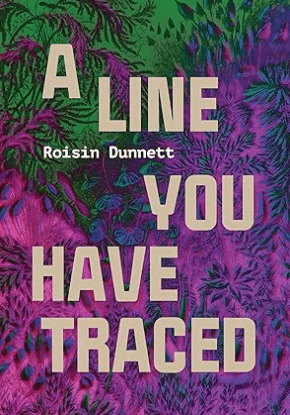
For all things fantasy, horror, and speculative fiction
Review Details
Review type: Book
Title: A Line You Have Traced
Author: Roisin Dunnett
Publisher: Feminist Press at The City University of New York
Release date: 15th April 2025

Reviewed by: Rym Kechacha
Other details: Hardback RRP £13.99
A Line You Have Traced by Roisin Dunnett
Book Review
Rym Kechacha
In a time about a hundred years ago, Bea is a young wife married to a kind and bumbling jeweller, spending her days working in the silver shop and recording the strange visits of a being she calls an angel. In a time like the present, Kay drifts, working in a gallery and as a receptionist, going to parties with her eccentrically cool friends, avoiding the news so as not to fall into a pit of helpless anxiety about the state of things. In a future where civilisation as we know it is slowly collapsing under its own weight, Ess is part of an anarchist organisation known at the Network. Living at a site just outside a huge city and doing her best to keep snails and slugs off the seedlings she’s trying to feed her community with.
The writing in this novel is sinuous and full of physicality. Dunnett meanders around time and space in a way you don’t find often in recent novels, as we live in an age where storytellers are exhorted to get to the point as quickly as possible. Is it a spoiler to tell you this is a time travel novel? I don’t believe so. Dunnett gives a lot of focus on the ‘soft’ aspect of this science, rather than the physics. In many ways this is a smart narrative decision because there are only a few people on earth who have anything near the physics knowledge required to understand (though I find myself wondering about the energy requirements of such a machine, particularly for inventors who live in a civilisation on the verge of collapse.)
In some ways, the ethics, costs and risks associated with time travel are more interesting to explore. We are all familiar by now with the idea that just because we can, it doesn’t mean we should. Stories like this prompt the pleasurable branching of thoughts about the physics of time, destiny; the multiple choice made each minute by each and every one of us that make and unmake and remake the world we are moving into. Time travel narratives aren’t for everyone, for exactly these reasons. The unknowability soon starts to hurt the head, the if-this-then-that branching off in different directions and dimensions starts to feel like an itch you can’t scratch.
There is a vagueness and a lack of specificity to the historical details in the novel, events and communities I think are analogous to the battle of Cable street, the Jewish community of Bethnal Green, and older generation who had had to flee pogroms in Russia and Eastern Europe for safety, if still a fair bit of prejudice, in the east end of London. We wouldn’t necessarily know the novel to be about the Walthamstow Marshes, the river Lea, or London itself. I wonder if Dunnett made this choice to privilege the natural world and, indeed, all the writing about the marsh where the three women in each narrative strand is beautiful. Marshes, bogs, fens and all the generally flat, wet places of the world are woefully underserved in literature, but in this novel the marsh is an enduring place of wildness that resists ‘development’ or ‘progress’ and perhaps even ‘time’.
Marshes are famously unproductive (for capitalism) and boring (for stories) but in this novel the marsh is a haven in all times and out of time for our young women to see a horizon denied to them in their daily lives. Characters are referred to by alphabetical monikers- Ade, Bea, CeeCee, Kay, El, Em, which lends the characters the same air of unreality as the setting. Perhaps these choices are to lend the novel the air of a fairy tale, allegory or myth. Perhaps we are encouraged to see ourselves in someone in the novel, perhaps Kay with her pervasive air of dread, partying as the world starts to fall apart. Or perhaps Ess with her snail-ridden seedlings, trying to hold back the tide of chaos with non-hierarchical organisations and consensus decision making.
This is a novel of a kind I suspect we will start to see more of (and I for one look forward to them) which will stop using their themes of climate breakdown and civilisational collapse as warnings to their readers and start to be instructional guides for what to do, think and feel when it comes. Grieve. Keep your friends close. Watch out for the snails. Build a time machine.
Tags: FantasyFeministLGBTQ+Science FictionTime Travel
Category: Book Review
All reviews
Latest Reviews:
- The God and the Gumiho by Sophie Kim
- Citadel of the Moon by Mike Chinn
- Hemlock and Silver by T. Kingfisher
- Thirsty by Lucy Lehane
- Solodark RPG
- Shadowdark RPG
- Dancer’s Lament by Ian C. Esselmont
- The Legacy of Arniston House by T.L. Huchu
- Elemental Forces edited by Mark Morris
- Gifted and Talented by Olivie Blake
Review tags:
Action (48) Adventure (69) Contemporary Fantasy (18) Fantasy (119) Gothic Horror (12) Harper Voyager (12) Historical Fantasy (14) Hodderscape (12) Horror (74) Orbit Books (33) Romance (28) Romantasy (12) Science Fiction (35) Titan Books (36) TorDotCom (12)
Leave a Reply